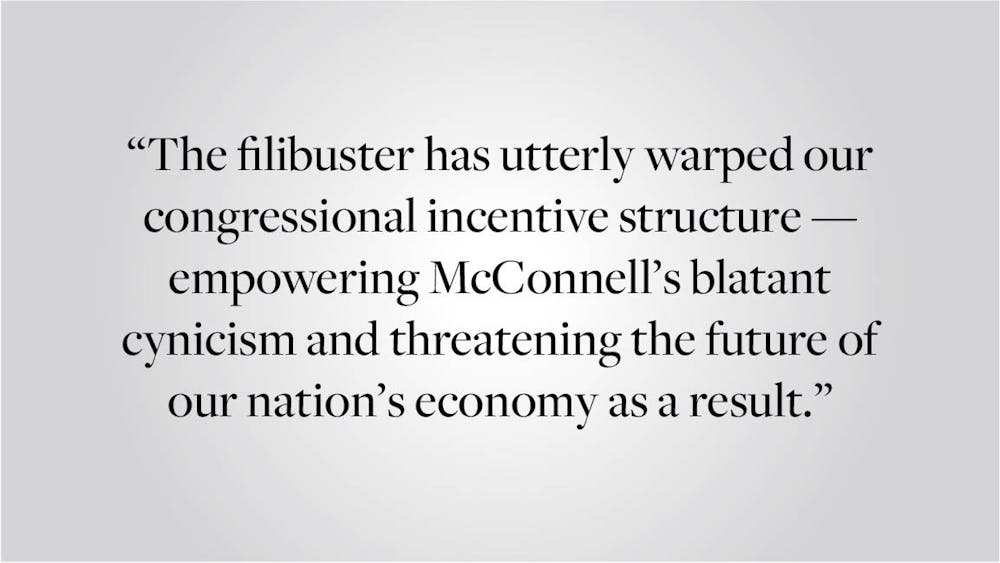Last Tuesday, the House of Representatives voted to raise the federal debt ceiling, narrowly avoiding fiscal calamity had the United States defaulted on its loans. The vote came less than a week after Senate Minority Leader Mitch McConnell reached a deal with Senate Democrats to lift the statutory limit on federal borrowing by $480 billion, effectively delaying the looming debt crisis until early December. While a long-term solution has yet to be negotiated, McConnell has made it clear that he plans to filibuster all additional attempts to raise the debt ceiling moving forward.
By requiring 60 votes to end debate, the filibuster effectively imposes a supermajority vote requirement on proposed legislation. As McConnell’s blatantly partisan brandishing of the filibuster reveals, this outdated procedural rule clearly does little to encourage bipartisan compromise. In fact, in today’s ongoing debt ceiling debate, the filibuster has both enabled a small minority of senators to hold the nation’s economy hostage simply to teach Democrats a lesson and utterly warped our congressional incentive structure — empowering McConnell’s blatant cynicism and threatening the future of our nation’s economy as a result.
With 10 Republican votes effectively required to pass all legislation, the modern filibuster allows the minority party to potentially kill the entire legislative agenda of the majority party. Many argue that this procedural rule encourages bipartisan compromise: Unable to pass legislation with a simple majority vote, the party in power is theoretically forced to negotiate with senators from across the aisle. However, this connection plainly isn’t born out in the historical record: While filibuster usage has increased exponentially over the past several decades, Congress has become less and less productive over roughly the same time period.
“The feedback loop of American politics is fundamentally broken,” wrote Vox Co-Founder and New York Times Columnist Ezra Klein. “Rather than judging the results of the agenda they voted for, voters are left assessing why so little has happened, and trying to understand who is to blame for their problems going unsolved.”
In today’s polarized political landscape, the minority party has virtually no incentive to compromise with the majority, making the filibuster’s 60 person vote requirement an impossible threshold for most legislation. In cases of political stagnancy, voters rightfully frustrated by the lack of legislative action tend to punish the majority party at the polls regardless of who is actually to blame. And with control of Congress now up for grabs in virtually every cycle, the minority party has little motivation to make concessions in the current Congress when they could potentially regain the majority just a few months down the road.
In order to compromise with Republicans, then, Democrats must effectively offer them something of greater value than winning the next election — something that for politicians is virtually impossible to find. Herein lies the filibuster’s greatest flaw: By relying on compromise from the political actors least incentivized to make it, the filibuster empowers obstruction at the expense of actual governing.
Debates over the debt ceiling are nothing new. In fact, the debt ceiling has been raised 78 times since 1960. Three of these votes even occurred during the Trump presidency, all of which McConnell tellingly supported. However, stonewalling in these debates has become increasingly common over the past several decades. For instance, in 2011, Republicans once again brought the economy to the brink by refusing to raise the federal debt ceiling unless Democrats made significant cuts to federal spending. While congressional Republicans were perhaps acting irresponsibly even then, the difference between then and now is stark: In 2011, Republican leadership actually had specific demands for the majority to consider. Today, McConnell has none.
“Republicans’ position is simple. We have no list of demands,” McConnell wrote in a public letter to President Biden. “For two and a half months, we have simply warned that since your party wishes to govern alone, it must handle the debt limit alone as well.”
Foregoing an ideological case for this stonewalling, McConnell has instead opted to say the quiet part out loud. Making no attempt to hide his bluntly partisan motivations, McConnell’s grim candor exposed the filibuster as the tool for nihilistic partisan maneuvering it has long been, utilitized by both Democrats and Republicans when politically advantageous.
Denmark is the only other modern democracy required to continuously raise its federal debt ceiling. Notably, however, Denmark operates in a parliamentary system. While abolishing the filibuster would in no way make the United States as directly democratic as Denmark (as Klein once again points out, the United States still has significantly more minority veto points than any other comparable democracy), eliminating the supermajority vote requirement in the Senate would similarly award the ability to govern to the majority coalition. In this system, without a filibuster, the majority party has both the incentive and ability to govern, making the decision to raise the federal debt ceiling an obvious function of government rather than an opportunity for partisan posturing. Denmark has only been required to raise its federal debt ceiling one time within the last 20 years, passing the measure well before the nation even came close to brushing up against the limit.
As the current debt ceiling crisis illuminates, the filibuster does more to enable cynically motivated stonewalling than it does to encourage bipartisan compromise. If politicians wish to realign this warped congressional incentive system once and for all, they must move to abolish the filibuster before McConnell decides, again, to leverage our nation’s economy for a theoretical boost in the polls.





